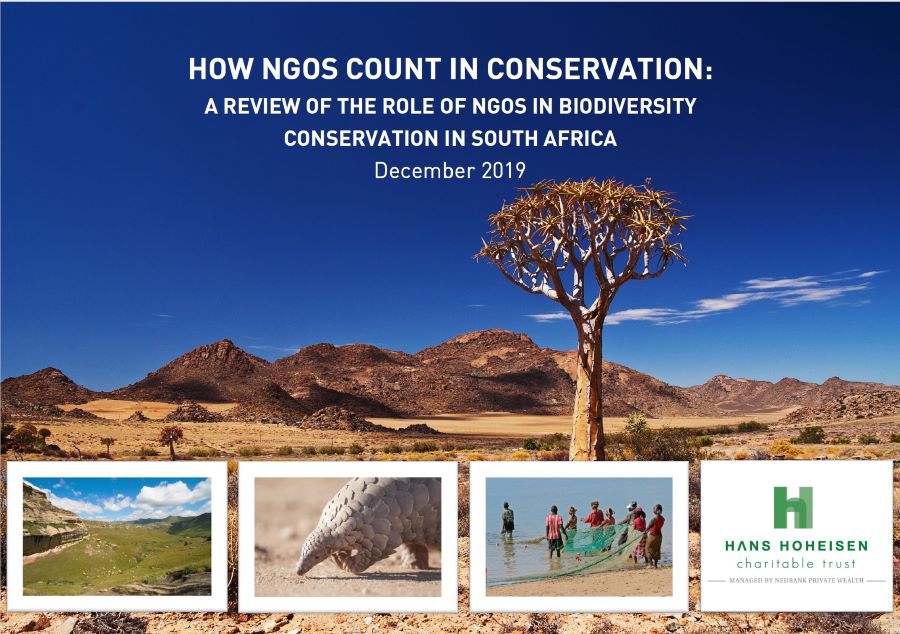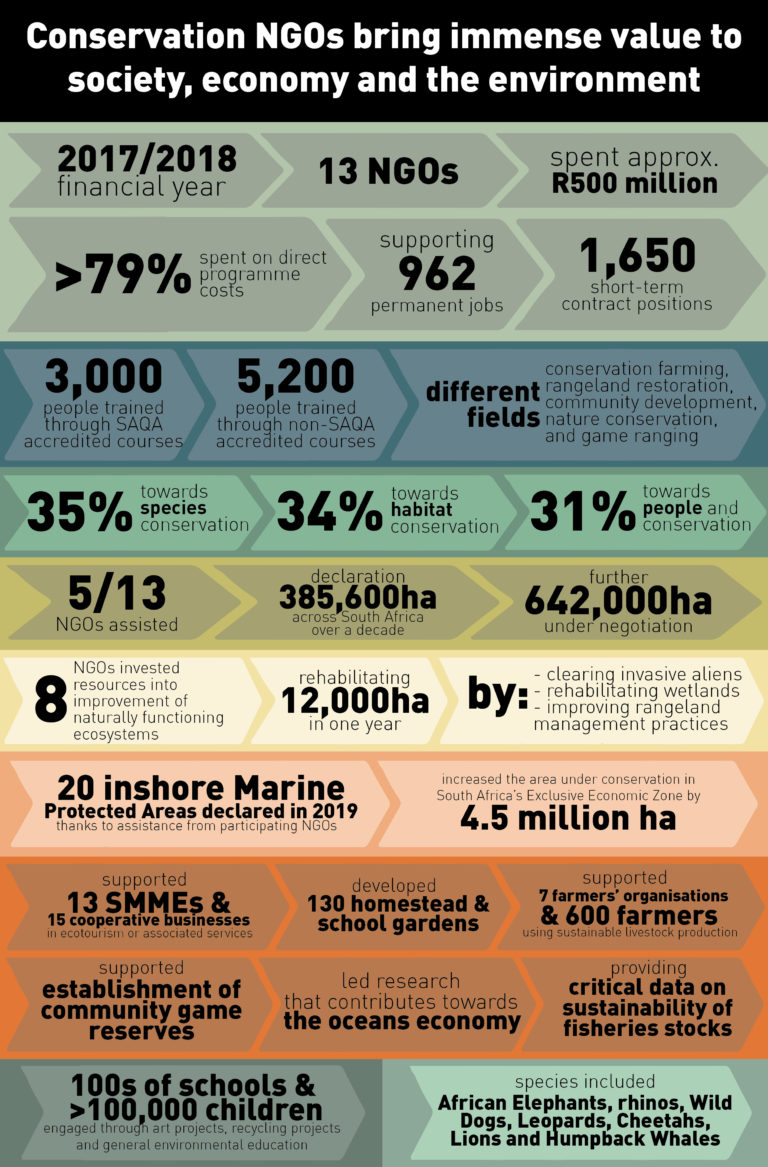
22 January 2020
Conservation NGOs working to protect biodiversity in South Africa contribute significantly to the persistence of numerous species and habits and the life-giving services that they provide, as indicated in a new report just launched.
As a sector, biodiversity NGOs focus their attention on conserving wildlife and indigenous plant species and their habitats; providing environmental education and skills development; acting as watchdogs for environmentally damaging practices; supporting the development and enforcement of effective policy and regulations; undertaking critical research; developing knowledge and data for improved decision-making; and encouraging responsible consumption and business practice. All of this contributes to the survival of a range of threatened species and habitats and ensures a more sustainable way of life.
The Endangered Wildlife Trust, with funding from the Hans Hoheisen Charitable Trust and working with an independent review panel, has recently produced a report examining the combined contributions of 13 prominent South African NGOs towards biodiversity conservation. The NGOs reviewed were African Conservation Trust, Conservation South Africa, Delta Environmental Centre, the Endangered Wildlife Trust, Institute of Natural Resources, Leadership for Conservation in Africa, National Association of Conservancies of South Africa, Peace Parks Foundation, South African Association for Marine Biological Research, Southern African Wildlife College, Wilderness Foundation, Wildlife ACT, and WILDTRUST. As this was the first attempt that an assessment of this nature has ever been undertaken, the number of participating NGOs was limited to those that are members of the International Union for Conservation of Nature (IUCN), the global authority on the status of the natural world. To be granted IUCN membership, NGOs have to meet a number of standard criteria, giving them a tangible measure of credibility and standing. Future iterations of this report will include a wider diversity of local NGOs.
The primary purpose of the assessment was to measure the impact of the conservation work undertaken by these NGOs. Also assessed was the way in which the NGOs set conservation priorities and measure impact, how much funding is received and how this is spent, and how many people are employed or upskilled and thus directly benefit from their work. The impressive list of accomplishments of these NGOs can be found in the report here, and demonstrates the substantial value offered to donors and supporters of these organisations. As these NGOs represent only a small proportion of conservation organisations operating in South Africa, a detailed assessment of the contributions of all the conservation NGOs would likely demonstrate a substantial set of achievements. Some of the highlights from report included:
- Five of the participating NGOs worked with provincial nature conservation departments and other organisations to expand the area of land under conservation by 22,165 ha during 2018 alone, while a further 642,000 ha are under negotiation for potential future addition to this area.
- Two of the NGOs worked with the government to expand South Africa’s Marine Protected Areas by a massive 4.5 million ha, which represented a ten-fold increase in marine areas under formal protection.
- Eight NGOs invested resources into the improvement of naturally functioning ecosystems (also known as ecological infrastructure) and rehabilitated an area of approximately 12,000 ha by clearing invasive alien plants, rehabilitating wetlands, and improving rangeland management practices.
- NGOs focussed on conserving species in their natural environments, resulting in a stable Wild Dog population, increasing Cheetah populations (the only national Cheetah population to be increasing anywhere in the world), and increasing Wattled Crane populations.
- Two NGOs worked with captive breeding institutions to conserve threatened species outside their natural environments (termed ex situ conservation). Although amphibian conservation is not common, one big outcome was the breeding of 600 Pickersgill’s Reed Frogs, which is an Endangered species, and the successful release of 250 of these into the wild.
- Eight NGOs conducted activities addressing the illegal wildlife trade, with a primary focus on stopping rhino poaching. Measuring impact in this field of conservation is particularly difficult, but some positive outcomes were the complete cessation of rhino poaching in 25 KZN private reserves, the dehorning of 24 rhinos in a community reserve in KZN, the deployment of 13 wildlife detection dogs at high-risk sites across the country, and a social media demand reduction campaign in Vietnam that reached approximately one million people.
- Considerable conservation work focused on interactions with people, with NGOs working on projects involving the biodiversity economy, biodiversity mainstreaming, public engagement, foundational knowledge and training.
- During the 2018 financial year alone, the 13 NGOs spent approximately R500 million, with 36% of this going towards species conservation, 29% towards habitat conservation, 12% towards community work and 11% towards training and education.
- A total of 962 people were permanently employed, and 1,600 people were employed on a contract basis, thus demonstrating the enormous impact made by only 13 NGOs on human wellbeing and livelihoods.
This assessment provides the government with a simple and accessible way to recognise the contribution made by NGOs, and the public and private donors that support them. It provides insight into the progress made by civil society towards protecting South Africa’s national heritage and identifies opportunities for improved collaboration between the organisations. The assessment further assists NGOs to evaluate their own performances against those of other NGOs working in the sector and to thus improve the measure of their impact. For donors to the NGOs, they can clearly see the impact of their funding and the critical role that funders play in conserving wildlife and the environment in South Africa today.
The EWT is grateful to the Hans Hoheisen Charitable Trust (managed by Nedbank Private Wealth) for funding this work.
https://mailchi.mp/ewt/ngos-form-the-ba ... 113daa1376



